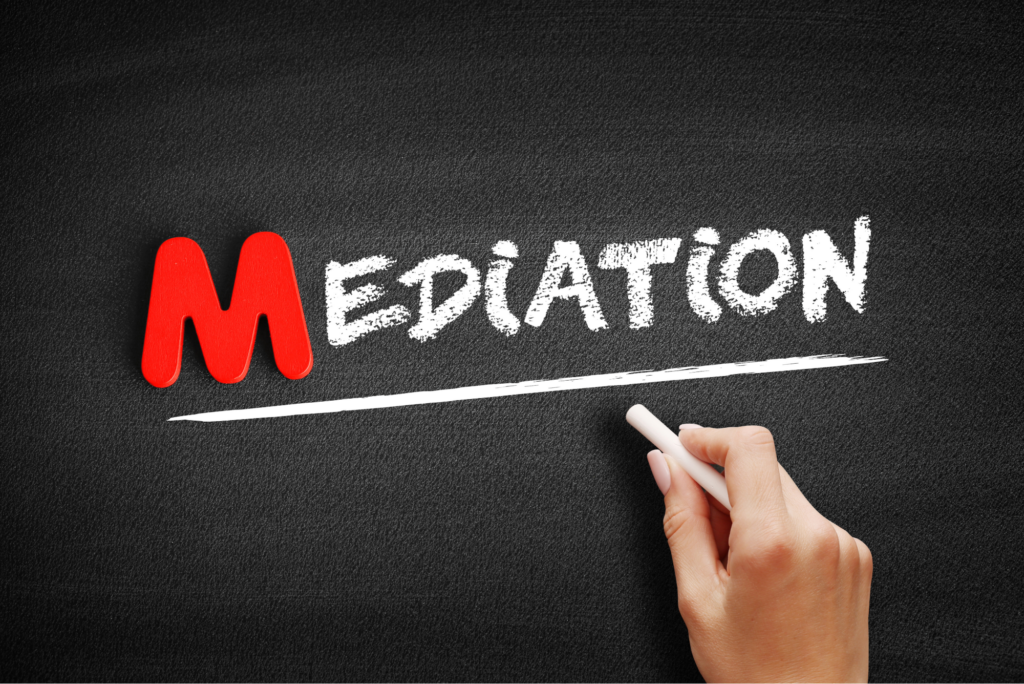In a world often fraught with conflicts, having the skills to assist people in resolving their disputes is invaluable. Mediation is a process to resolve disputes amicably and constructively. If you are considering a career as a mediator or want more information about mediation, this blog post will guide you through how to become a mediator and give you insight into this rewarding profession.
Understanding Mediation
Mediation is a voluntary process where a neutral third party helps disputing parties communicate, understand each other’s perspectives, and find common ground. Unlike a judge or arbitrator, a mediator does not impose a solution; instead, they empower individuals to craft their own resolutions. This approach not only preserves relationships but also fosters a sense of ownership over the outcome and helps the participants develop communication skills.
The Importance of Mediators
Mediators play a crucial role in various settings, including:
Family Disputes: Mediators can help people reach agreements about property division, financial support, and parenting issues. Mediation is also one of the recognized early dispute resolution processes in Saskatchewan, meaning that for people who are in disputes related to family law, this might be the right process option for attempting to reach a solution before proceeding with litigation.
Workplace Conflicts: Mediators can help employers, management, and staff resolve disputes related to the workplace.
Community Disagreements: Mediators can help neighbours and community associations to resolve conflicts and build sustainable solutions.
Estate Disputes: Mediators can help beneficiaries and trustees resolve disputes related to settling estates. This is often preferable rather than litigating estate issues because it protects inheritances.
Other Legal Matters: Mediators can help parties resolve their other legal disputes outside of the court process. This helps to repair and rebuild relationships and often saves the participants time and money when compared with adversarial methods of dispute resolution, such as litigation.
The need for skilled mediators is growing as more individuals and organizations recognize the benefits of resolving conflicts through dialogue and building healthy conflict engagement systems.

Becoming a Mediator
Assess Your Skills and Interests
Before embarking on a career in mediation, it is important to evaluate your attributes and skills. Successful mediators often possess strong communication skills, empathy and compassion, problem-solving abilities, and can remain neutral and impartial regardless of how persuasive or strong one side of an argument may be.
Gain Relevant Education and Training
While there is no specific educational requirement to become a mediator, relevant training can significantly enhance your effectiveness.
There are many courses offered both online and in person. Some educational and other institutes provide these as stand-alone training, as part of a diploma, degree, or certificate program.
Some folks struggle to find mediation-specific courses. CommonSense Mediation Academy offers many mediation-specific courses and training opportunities. Other courses and training that are relevant to the practice of mediation may include effective communication training, human resource courses, psychology and emotions training, conflict management programs, and more.
If you are interested in a course, training, workshop, or seminar, and are unsure if it will move you toward a career in mediation, you can book a mediation education consult with the administrator of CommonSense Mediation Academy and they can guide you in your education journey:
Practical Experience
Practical experience is crucial to developing your mediation skills. You can seek internships or volunteer opportunities with organizations that offer mediation services. You may also choose to find a mentor in the field who can provide guidance, support, and insights from their own experiences. CommonSense Mediation Academy provides mediation practice group sessions for learners to participate in mock mediation sessions and role-playing exercises to hone their mediation skills.
The more experience you gain, the more confident and competent you’ll become in real-world situations.
Obtain a Designation
It is not mandatory to have a designation, though many mediators are most comfortable achieving a designation prior to beginning a mediation practice. Designations can enhance your confidence, signal skill recognition to others, and help you market yourself as a mediator. There are different organizations who grant designations within the field of mediation. You may often see mediators referring to themselves as “Qualified Mediators” or “Chartered Mediators”. These two designations are granted by the Alternative Dispute Resolution Institute of Canada (ADRIC) through their regional affiliates. These designations are provided through an application and approval process. For more information about becoming a Qualified or Chartered Mediator, click here to visit the Alternative Dispute Resolution Institute of Canada (ADRIC) website.
Build a Network
Networking is essential in the field of mediation. Connect with other mediators, attend conferences, and join professional associations such as the Alternative Dispute Resolution Institute of Canada (ADRIC) or the International Mediation Institute (IMI). These connections can provide support, resources, and potential job opportunities.
Market Your Services
Once you’re ready to practice as a mediator, it’s time to market your services. Create a professional website, utilize social media platforms, and consider offering workshops or seminars to showcase your expertise. Building a reputation as a skilled mediator will help you attract clients and referrals. CommonSense Mediation Academy offers a marketing and mediation business development course for those interested in how to specifically market mediation services.

Continuing Engagement and Education
The field of mediation is ever-evolving, so it is crucial to stay up to date on best practices, changes to legislation, and emerging trends. Engage in continuous professional development through:
- Advanced training:
Attend workshops on specific mediation styles or issues, such as family mediation or workplace conflict. CommonSense Mediation Academy offers a variety of training opportunities. You can check out what might be right for you by clicking here to view training options.
- Reading:
Stay informed by reading books, articles, and research related to conflict resolution. CommonSense Mediation Academy has a list of recommended books and resources. Check them out by clicking here.
- Participating in practice groups:
Join groups of mediators who meet regularly to discuss challenges, share experiences, and learn from one another. CommonSense Mediation Academy has a Mediation Practice Group; join by clicking here.

The Rewards of Being a Mediator
Becoming a mediator can be an incredibly rewarding career choice. Here are just a few of the benefits:
- Making a difference:
Helping parties resolve their conflicts can lead to positive change in their lives and relationships. This can further improve workplaces, organizations, communities, and families!
- Variety:
Every mediation session is unique, presenting different challenges and learning opportunities. This keeps mediators in a constant state of learning and novelty.
- Flexible work environment:
Many mediators have the option to work independently or within organizations, allowing for a diverse work-life balance.
- Personal growth:
The skills mediators develop through their careers can also enhance their personal relationships and communication skills in everyday life.
Conclusion
Becoming a mediator is a meaningful way to contribute to conflict resolution in our society. By following these steps—assessing your skills, gaining education and training, acquiring practical experience, obtaining a designation, and engaging in continuing education—you can embark on a fulfilling career in mediation. If you’re passionate about helping others navigate their differences and find common ground, mediation may be your calling. Explore resources, connect with professionals, and take the first step towards becoming a mediator today!
For more information and resources about mediation, visit www.commonsensemediation.ca or contact us to book an education consultation: admin@commonsensemediation.ca
Resources & References from this post:
Professional Designations | Alternative Dispute Resolution Institute of Canada
Alternative Dispute Resolution Institute | ADRIC
International Mediation Institute | IMI
Making Money Mediating | CommonSense Mediation Academy
Mediation Training | CommonSense Mediation Academy
Mediation Learning Resources | CommonSense Mediation Academy
Mediation Practice Group Sign-Up | CommonSense Mediation Academy


